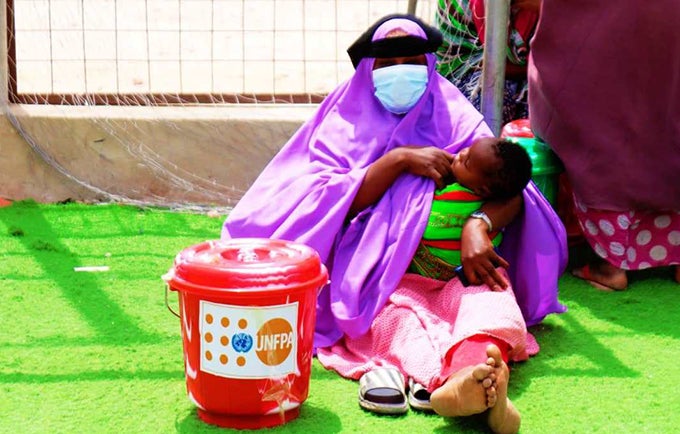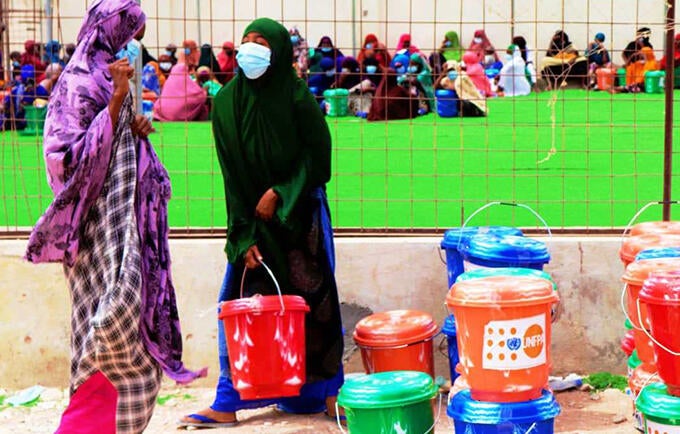Fadumo Abdi Essa, 33, is a mother of three children living in a camp for internally displaced persons (IDPs) in New Las’Anod. At first glance, the deep scars on her left eye and other parts of her face paint a reflection of the harsh life she has lived so far.
“I am not originally from Las’Anod. I run away from my rural home with my children to live a better life than the one I had fled from. Unknown men killed my husband, and I also got injured trying to escape from them,” said a very emotional Fadumo as she narrated her story, a testimony of her painful past before reaching the IDP.
She said she never went to school and so never learnt how to read or write. “I came from a poor family. My mother died when I was young,” said Fadumo, adding: “To earn a living now, I go around asking my neighbours if there are dirty clothes I can wash, and I also clean shops. Some days I can’t find anyone to work for, and it is difficult for me to return to my hungry children,” she said.
Fadumo recently benefited from a dignity kit provided by UNFPA through the Somaliland Nursing and Midwifery Association (SLMNA). The mother of three broke down and wept with happiness after she saw what was in the kit. She was asked if she could open the kit before going back to her home, and she agreed to do so. “I have never received such a kind of gift in my whole life,” said Fadumo.
UNFPA, the United Nations Population Fund, procures and distributes dignity kits – which contain hygiene supplies such as toothbrushes, toothpaste, shampoo, soap, sanitary pads, and underclothes – to women and girls of reproductive age in humanitarian settings.
UNFPA responds to emergencies, delivering lifesaving sexual and reproductive health supplies and services to protect the rights, safety and dignity of women and young people affected by crises. UNFPA ensures that women and girls’ reproductive health needs and protection concerns are integrated into emergency responses when disaster strikes. One of the ways in which UNFPA supports women and girls in the aftermath of natural disasters is by providing dignity kits.

a woman rests after receiving a dignity kit
Initially, Fadumo did not know how to register and to be eligible for the dignity kit. “So, many times, I stood by a tree outside the camp watching as other women and girls receiving the kits, and I always wondered as to what many was inside as were happy when they opened their package. One morning, as I watched, a woman called me quietly asking for my name and why I was not registered. She registered me and told me where and when to come back for the kit,” explained Fadumo.
She said she barely slept the night before she went to receive the dignity kit. “I was very excited and anxious about what they would give me. I slept very little that night. I am delighted and grateful, especially because I was not expecting such amazing gifts. This will help me a lot as I am a poor, single mother,” said Fadumo.
Dignity is about more than physical and mental well-being. It is about meeting the basic needs of the women who hold together the fabric of our communities in times of crisis. A dignity kit comprises the basic items that women and girls need to protect themselves and maintain hygiene and respect in the face of natural disasters.
Dignity kits are designed to be adaptable to suit the cultural needs of affected communities across the world. The simplest items can have the most significant impact: Sanitary supplies are used during menstruation, and undergarments and toiletries provide basic hygiene. Without them, women may be inhibited from carrying out daily tasks or hesitate to venture out to access relief aid; girls may miss school, too. And they offer protection: a flashlight will enable women to travel or access bathroom facilities at night, a time when they are particularly vulnerable to gender-based violence. In addition, radios facilitate the communication of vital information like where to seek help if in distress or the location of the closest health facility if roads are blocked.


